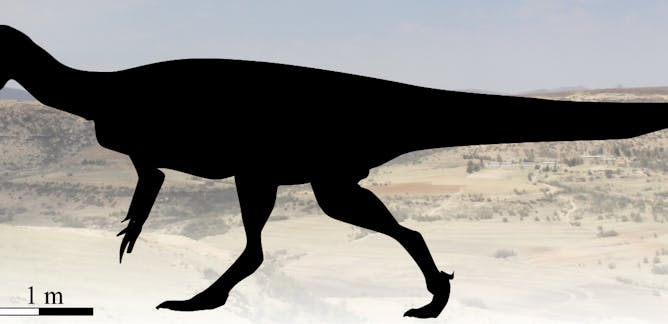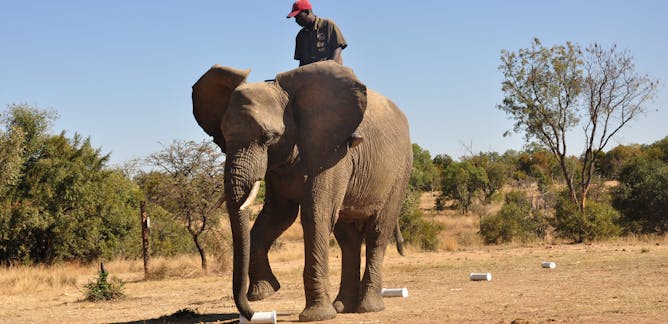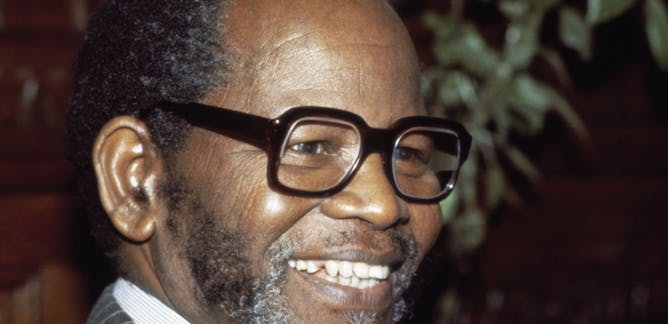| |
|
|
|
|
|
|
| |
|
Editor's note
|
|
Some 200 million years ago, in the southern part of the supercontinent Gondwana - which, today, is southern Africa - a huge carnivorous dinosaur roamed the landscape alongside smaller species. Fossil footprints have provided the first evidence of this gigantic beast’s existence. Lara Sciscio writes what led to this remarkable discovery.
The head of the World Health Organisation (WHO) Tedros Adhanom Ghebreyesus has reversed the decision to make Zimbabwean President Robert Mugabe a goodwill ambassador for non-communicable diseases. Luke Allen and Alice Bouriez explain that violence, political oppression and corruption – which, for many of his critics, Mugabe embodies – are anathema to the WHO’s founding principles.
African elephants have about 2000 genes associated with olfactory reception. In fact, they have the highest count of any species tested to date, meaning that they could quite possibly be the best smellers in the animal kingdom. Ashadee Kay Miller explores how the giant mammals can use this potent sense of smell to sniff out landmines.
South Africa’s governing African National Congress stands accused of having lost its way under President Jacob Zuma. The party itself has implored various factions to return to its liberation era values of selflessness as espoused by revered leader Oliver Tambo. But who was Tambo and what makes him an exemplar of good leadership? Luli Calllinicos explains.
|
Natasha Joseph
Science & Technology Editor
|

|
|
Top Stories
|

Lara Sciscio, University of Cape Town
Until this discovery, theropod dinosaurs were thought to be considerably smaller, at three to five metres in body length, during the Early Jurassic.
| |

Luke Allen, University of Oxford
Unpicking the baffling case of how one of Africa's dictators became the world's top ambassador for non-communicable diseases – at least for a while.
|

Ashadee Kay Miller, University of the Witwatersrand
Elephants have the highest count of olfactory receptor genes of any species tested to date. This suggests that they may be the best smellers in the animal kingdom.
| |

Luli Callinicos, University of the Witwatersrand
Factions within South Africa’s ANC nostalgically point to the example of Oliver Reginald Tambo whose seen as an exemplar of integrity, personifying an ideal leader who served the party selflessly.
|
|
|
Business + Economy
|
-
Steven Friedman, University of Johannesburg
South Africa's finance minister's medium term budget speech offered hope of potential economic game changes. But will he be bold enough to make them?
-
Seán Mfundza Muller, University of Johannesburg
South Africa's 2017 medium term budget reveals a growing gap between revenue and expenditure which places the country in a highly vulnerable financial state.
-
Roger Southall, University of the Witwatersrand
South Africa's finance minister was honest about the problems facing the country. But he made no real suggestions that the government will start doing things differently.
-
Timothy Njagi Njeru, Egerton University
Kenya's government responded with subsidies to tend to the 2017 maize crisis to ensure that it remained affordable. However, the country needs long term solutions to this perennial challenge.
|
|
Politics + Society
|
-
Franzisca Zanker, Freiburg University
Gambia became a symbol for democratic change earlier this year when former dictator Yahya Jammeh was peacefully ousted through the ballot box. Now Europe wants its Gambian immigrants to return home.
-
Julie Berg, University of Cape Town
The future of private security is beset by many challenges and what forms of regulation would be required to align it with the public interest.
-
Anwar Mhajne, University of Cincinnati ; Crystal M Whetstone, University of Cincinnati
Activists often face intransigent regimes and ruthless warlords. But women can use traditional insights into femininity and motherhood for political mobilisation and resistance.
-
Hendrik Kraetzschmar, University of Leeds; Barbara Zollner, Birkbeck, University of London
Personal freedoms and self-expression have come under attack.
-
Ian Macqueen, University of Pretoria
Inquests into atrocities committed under apartheid are important because many South Africans are beginning to question whether justice was done under the country's truth and reconciliation process.
-
Andrew Faull, University of Cape Town
Born and raised in poor circumstances, many South African police officers find themselves in the job after original aspirations slipped beyond reach.
|
|
Science + Technology
|
-
Julien Benoit, University of the Witwatersrand
Recent research suggests that humankind's origins lay outside of Africa. This is the nature of science: a paradigm that cannot be questioned on a regular basis becomes a dogma.
-
Brenda Wingfield, University of Pretoria; Kit Vaughan, University of Cape Town
South Africa's National Research Foundation will dramatically scale back “incentive” funding to rated researchers, both those who already have a rating and those who will be rated in the future.
|
|
Environment + Energy
|
-
Sheryl L Hendriks, University of Pretoria; Katrin Glatzel, The International Food Policy Research Institute (IFPRI) ; Ousmane Badiane, The International Food Policy Research Institute (IFPRI)
Policy choices made by Senegal, Ghana, Rwanda, Angola, Cameroon, Ethiopia and Togo over the past 15 years have led to significant reductions in child undernourishment.
-
Julie Snorek, Autonomous University of Barcelona
The ‘war on terror' in Mali is building alongside a growing number of multinationals hoping to extract the oil and gas reserves of the Taoudeni basin, and a strong foreign military presence.
|
|
Health + Medicine
|
-
Andrew Githeko, Kenya Medical Research Institute; Ednah Ototo, Kenya Medical Research Institute
Malaria is a major public health problem that affects 106 countries globally. A rigorous and systematic approach to predict and control malaria transmission is needed.
-
Jacqueline Weyer, National Institute for Communicable Diseases
In the 50 years following the discovery of the Marburg virus there have only been 12 known outbreaks.
-
Kerrigan McCarthy, National Institute for Communicable Diseases
Health authorities in South Africa have launched an investigation to find the food source that has resulted in an unprecedented increase in listeria cases across the country.
|
|
Arts + Culture
|
-
Vashna Jagarnath, Rhodes University
If Rosa Luxemburg and her comrades had been successful with their German revolution in 1919, history would most probably have taken a very different course, avoiding the rise of fascism in Europe.
|
|
Education
|
-
Gideon Nomdo, University of Cape Town
Students experience intense feelings of discomfort, confusion and even embarrassment at being classified as “different” and an “anomaly” alongside the norm of white academic success.
-
Michael E. Rose, University of Cape Town
The low share of women revealed in this data is problematic for two reasons: a lack of diversity, and what it shows about women's participation in the social network of informal collaboration.
|
|
| |
| |
| |
| |
| |
| |
|
|
|
|
|
|
| |